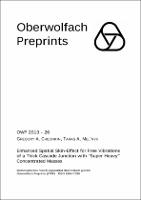Zusammenfassung
The asymptotic behavior (as $\varepsilon \to 0$) of eigenvalues and eigenfunctions of a boundary-value problem for the Laplace operator in a thick cascade junction with concentrated masses is studied. This cascade junction consists of the junction’s body and a great number $5N= \mathcal{O}(\varepsilon^{-1})$ of $\varepsilon$-alternating thin rods belonging to two classes. One class consists of rods of finite length and the second one consists of rods of small length of order $\mathcal{O}(\varepsilon)$. The mass density is of order $\mathcal{O}(\varepsilon^{-\alpha})$ on the rods from the second class and $\mathcal{O}(1)$ outside of them. There exist five qualitatively different cases in the asymptotic behavior of eigen-magnitudes as $\varepsilon \to 0$, namely the case of “light” concentrated masses $(a \in (0,1))$, “intermediate” concentrated masses $(\alpha=1)$ and “heavy” concentrated masses ($\alpha \in (1, +\infty")$) that we divide into “slightly heavy” concentrated masses ($\alpha \in (1,2)$), “moderate heavy” concentrated masses ($\alpha=2$), and “super heavy” concentrated masses ($alpha>2$). In the paper we study the influence of the concentrated masses on the asymptotic behavior of the eigen-magnitudes in the cases $\alpha=2$ and $\alpha>2$. The leading terms of asymptotic expansions both for the eigenvalues and eigenfunctions are constructed and the corresponding asymptotic estimates are proved. In addition, a new kind of high-frequency vibrations is found.

